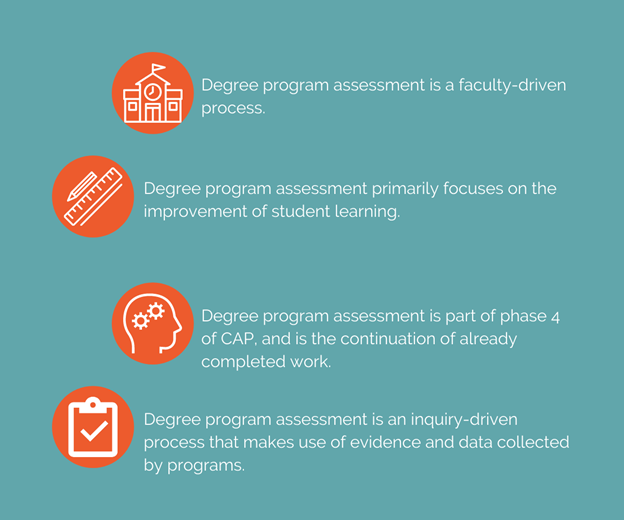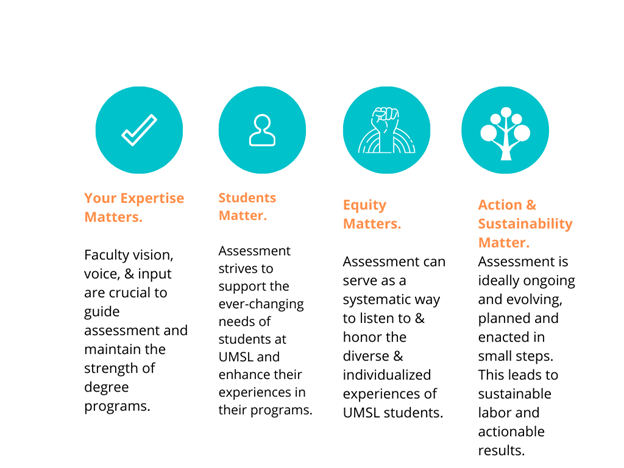“Assessment” is a term that can often feel heavy or intimidating. Similarly, “assessment” can mean a variety of different things, depending on the context and purpose of invoking the term. To begin this handbook, we feel it is helpful to explain what we mean when we discuss “assessment plans” and “degree program assessment” at UMSL. We will offer local, contextual nuance to assessment, discussing what thoughtful assessment can mean for our faculty, students, and the institution overall. We will illustrate why assessment matters and how it can be beneficial, sustainable, and actionable.
What is Degree Program Assessment at UMSL?
Degree Program Assessment focuses on entire degree programs and improving student learning
When we discuss assessment in this handbook, we are referring to degree program assessment. Degree program assessment focuses on coming to a deeper understanding of the curriculum of an entire program. A driving question at the core of degree program assessment is: how are students meeting the program’s designated learning outcomes?
Assessment of degree programs is broad and ongoing; it is a process committed to improving student learning. While other important findings might arise that are helpful to departments, the central goal is to continually enhance students’ experiences in the degree program and to support their learning. Faculty design their own assessment plans, study evidence from their own programs, analyze that evidence, and make decisions about how to take action based on what they learn. In this way, degree program assessment empowers departments which, in turn, empowers students.
Degree Program Assessment is inquiry-driven and and guided by faculty
We understand degree program assessment to be in the hands of faculty and designed to empower departments to continue to do their best work. Assessment is inquiry-driven as well. In particular, questions that arise from departments will be at the center of a meaningful degree assessment plan. As degree program assessment begins, departments will have an opportunity to (re)consider and (re)imagine their work via evidence-based inquiry:
- What do faculty want to know about learning?
- What is the faculty vision for the program and the students?
- How can faculty learn more about students and strive for that vision?
Inquiry in degree program assessment looks different for different programs. However, degree program assessment should use a variety of direct and indirect methods (see section VI) of measurement and draw from a variety of evidence. Methods and measurements are best decided upon by stakeholders in the programs, ideally through thoughtful conversation among all faculty and potentially student representatives, as well.
Degree Program Assessment is Phase 4 of the Curriculum Alignment Process
Degree program assessment is part of the Curriculum Alignment Process (CAP); this work is already underway in your department. Over the last two years, all departments have engaged in the CAP phases 1, 2, and 3. Departments developed learning outcomes for their programs and mapped their curriculum onto those learning outcomes. Degree program assessment is the next phase of CAP.

The following degrees have already completed their assessment plan drafts.
2024-2025 Academic Year
- College of Arts & Sciences
- Actuarial Sciences BS. Liaison: Michael Allison
- Bachelor of Liberal Studies. Liaison: Jim Craig
- Computer Science BS. Liaison: Mark Hauschild
- Cybersecurity BS, emphasis area in Computer Science. Liaison: Abderrahmen Mtibaa
- Economics BA. Liaison: Brian Speicher
- History BA. Liaisons: Anne Austin and Kara Moskowitz
- Master's in Public Policy Administration, emphasis areas in Individualized, Local Government Management, Nonprofit Organization Management, and Policy Research and Analysis. Liaison: Yuguo Liao
- Mathematics BA and BS. Liaison: Vinay Kanth Rao Kodipelly
- Music BA. Liaison: Zachary Cairns
- Physics BA and BS. Liaison: Sonya Bahar
- Studio Art, Bachelor of Fine Arts, emphasis areas in Graphic Design, Art Education, and Studio Practice. Liaison: Maureen Quigley
- College of Business Administration
- Financial Technology MS. Liaison: Tim Dombrowski
- College of Education, Liaison: Natalie Bolton
- Early Childhood Education BSEd. Lead: Lynn Navin
- Elementary Education BSEd. Lead: Katie O'Daniels
- Physical Education BSEd. Lead: Timothy Makuguya
- Secondary Education BSEd. Lead: Chaebong Nam
- Initial Teacher Education Cert. Lead: Julie Smith Sodey
- Education MEd. Lead: Shea Kerkhoff
- College of Optometry, Doctorate of Optometry. Liaison: Coral Dundon
- College of Nursing, Doctorate of Nursing Practice. Liaisons: Candace Rae Davis, Brittina Phillips, Elizabeth Segura
- College of Social Work
- Bachelor's of Social Work. Liaison: Lori Curtis
- Master's of Social Work. Liaison: Joe Pickard
2023-2024 Academic Year
- College of Arts & Sciences
- Biology BS. Liaison: Ambrose (Trey) Kidd
- Criminology & Criminal Justice BS. Liaison: Valerie Anderson
- Economics BS. Liaison: Brian Speicher
- Music BM. Liaison: Zachary Cairns
- Modern Language BA. Liaisons: Amy Michael (Japanese emphasis), Martha Caeiro (Spanish emphasis), Violaine White (French emphasis)
- Philosophy BA. Liaison: Lauren Olin
- Political Science BA, International Relations BA, Public Policy Administration BS. Liaison: Yuguo Liao
- Sociology BA and BS. Liaison: Larry Irons
- College of Business Administration
- Business Administration BS, emphasis areas in Finance, Information Systems and Technology, International Business, Management, Marketing, Entrepreneurship, Supply Chain Management. Liaisons: Brandon Ofem and Johnna Murray
- Cybersecurity BS, Information Systems emphasis and Information Systems and Technology BS, Supply Chain Analytics MS, Cybersecurity MS, Information Systems emphasis, Information Systems and Technology MS. Liaisons: Maureen Karig and Shaji Khan
- Master's of Business Administration, emphasis areas in Finance, Information Systems, International Business, Management, Marketing, Business Analytics, Supply Chain Management, Doctorate of Business Administration. Liaisons: Seemantini Pathak and Min Ju
Why Assessment Matters: The Benefits of Assessment
Meaningful assessment offers many benefits to programs that ultimately make curriculum building and teaching more attentive to students, more in tune with faculty expertise and interests, more aligned with disciplinary norms and expectations, and more streamlined and sustainable in terms of workload.
Faculty Expertise Matters
Students at UMSL value the depth of study and range of expertise of faculty; faculty knowledge, creativity, scholarship, and commitment to teaching are important to them. These attributes matter to assessment, as well.
Assessment is a process that focuses on faculty expertise and input. Faculty expertise is what will maintain the strength of degree programs through the assessment process, as well as letting programs evolve and improve based on the evidence they collect. Assessment cannot work without this input.
Degree program assessment is a valuable form of research that can be applied to affect student experience, faculty experience, and the reputation of the university in positive ways. Assessment can support faculty as they narrate the stories of their programs to external audiences, such as accrediting organizations, potential students, or university administrators.
Students Matter
Degree program assessment is focused on student learning. This is worth emphasizing again, as it is a central benefit that assessment brings with it. Assessment matters because it helps faculty, and the institution more broadly, to better understand the students.
We know from our own teaching that student dynamics change: their needs, their goals, and what works well for them as learners shift over time. As students change, our teaching must change with them. Faculty have adapted to changes by designing new activities, moving courses and assignments online, and experimenting with new course materials, to name a few. Degree program assessment provides a way to take changes and experimentation beyond just a single class. Assessment provides a way to collect evidence about these ever-changing needs of students in a way that reflects on entire departments and programs.
Equity Matters
With an awareness of the ever-changing needs of students, UMSL is committed to the diverse and individualized needs of UMSL students. Assessment allows for programs to incorporate the experiences of different demographics of students. Assessment provides an opportunity to listen deeply and attentively to students in an equitable manner, building a system which continuously listens to students whose experiences might have been historically marginalized, seen as outliers, or flattened in statistical representations. In other words, equity work is always ongoing, and assessment allows for a methodological approach to keep it moving, starting from the very heart of what degree programs want to accomplish, their learning outcomes.
Action and Sustainability Matter
Finally, assessment matters because it builds in ways to take action based on what programs learn. Degree program assessment aims to incorporate inquiry of faculty, the needs of students, and pursue equity and improved learning experiences. A key and exciting aspect of degree program assessment is that the process creates space for action after the data and evidence are collected and analyzed, making programmatic decisions and revisions based on what departments and faculty learn about programs.
Another key benefit to degree program assessment is that it is collaborative and ongoing, which means it will happen through small, well-organized steps. Assessment does not need to be one enormous and heavy undertaking every five years; instead, degree program assessment is a process composed of small moves, maintaining momentum. Once the process is established, an ongoing, paced assessment process will feel manageable, sustainable, and actionable. In fact, assessment research and models from other institutions indicate that a sustainable assessment process can be less laborious and make subsequent actions and revisions in programs more do-able. Degree program assessment can productively overlap with other aspects of departmental tasks or evaluations, such as five-year reviews or discipline-specific accreditations.
Why Assessment Matters: Other Benefits of Assessment
Assessment matters in concrete and powerful ways, improving educational experiences for all stakeholders. But there are other benefits of assessment that particularly enhance faculty satisfaction and departmental interactions. While the benefits listed below are not directly tied to the goals of degree program assessment, they are frequently cited and celebrated in assessment scholarship, and are undoubtedly part of why assessment is a worthwhile, meaningful undertaking.
Departmental Community
Assessment work builds connections within programs as faculty come to understand shared commitments and values for learning. The assessment process provides an opportunity for deeper connection among faculty, students, and department staff. Building community, although not an intended outcome of assessment, provides a space for collaboration towards a common goal of improved learning and the learning environment in departments.
Outreach
As departments design an assessment plan, they can learn that this process allows for a better sense of what they do and why what they do is so effective. Departments can discover ways to be more transparent and communicative about their work, reaching out to current students, to prospective students, to administrators, to community organizations, grant foundations, and other interested stakeholders. Assessment can help departments narrate their successes and tell their unique stories; the audiences for such storytelling and outreach are endless.
A Meaningful, Sustainable Process
As discussed throughout this guide, assessment is a meaningful process that leads to growth.
The process of assessment often involves:
- Departmental reflection, discussion, and revision, which prompts learning more about students, as well as part of degree programs that faculty might not be as familiar with.
- From there, departments develop programmatic structures and plans to stay current in their field(s) and be connected with the campus community.
- Because assessment is designed to happen in small, ongoing steps (rather than one giant lift or fell swoop), the work is do-able and the growth sustainable. In other words, an ongoing assessment process, while not simple and certainly daunting at the start, can ultimately be less laborious once enacted because processes maintain their momentum and also can inform other departmental work, such as reviews or accreditation.

Jump to Section...
- Purpose of Degree Program Outcome Assessment
- Principles of Good Practice for Assessing Student Learning
- Identification of Team to Design the Assessment Plan
- Asking Questions / Meaningful Inquiry
- Reviewing/Reflecting on Program Learning Outcomes
- Choosing Evidence of Student Success in Program Learning Outcomes
- Establishing Benchmarks and Targets
- Sampling Methods for Degree Program Assessment
- Continuous Assessment/Improvement
- Analyzing and Sharing Assessment Results
- Developing Action Plans (Closing the Loop)
- References and Resources
- Sample Plan Template
- Cohort Meeting Materials